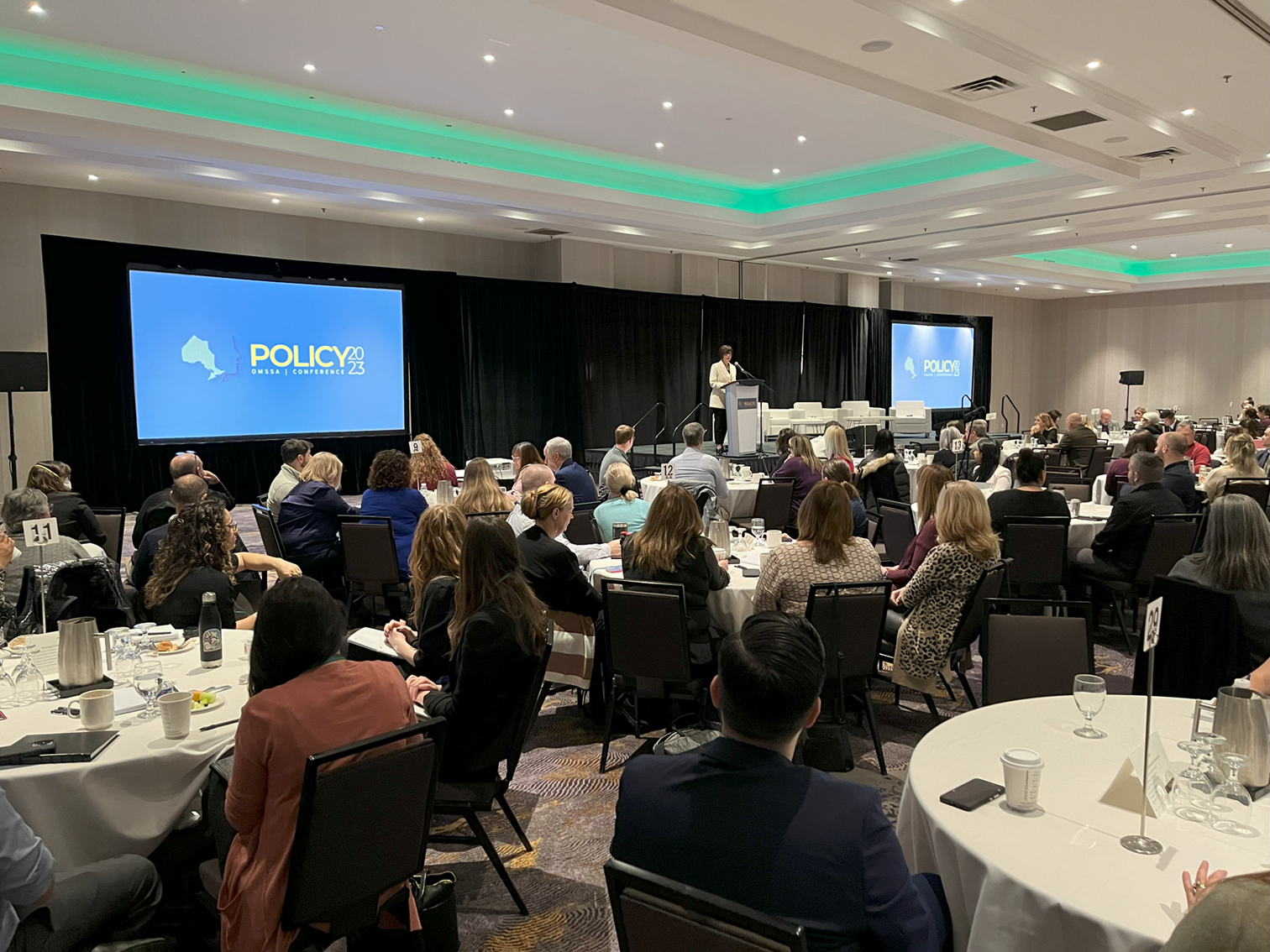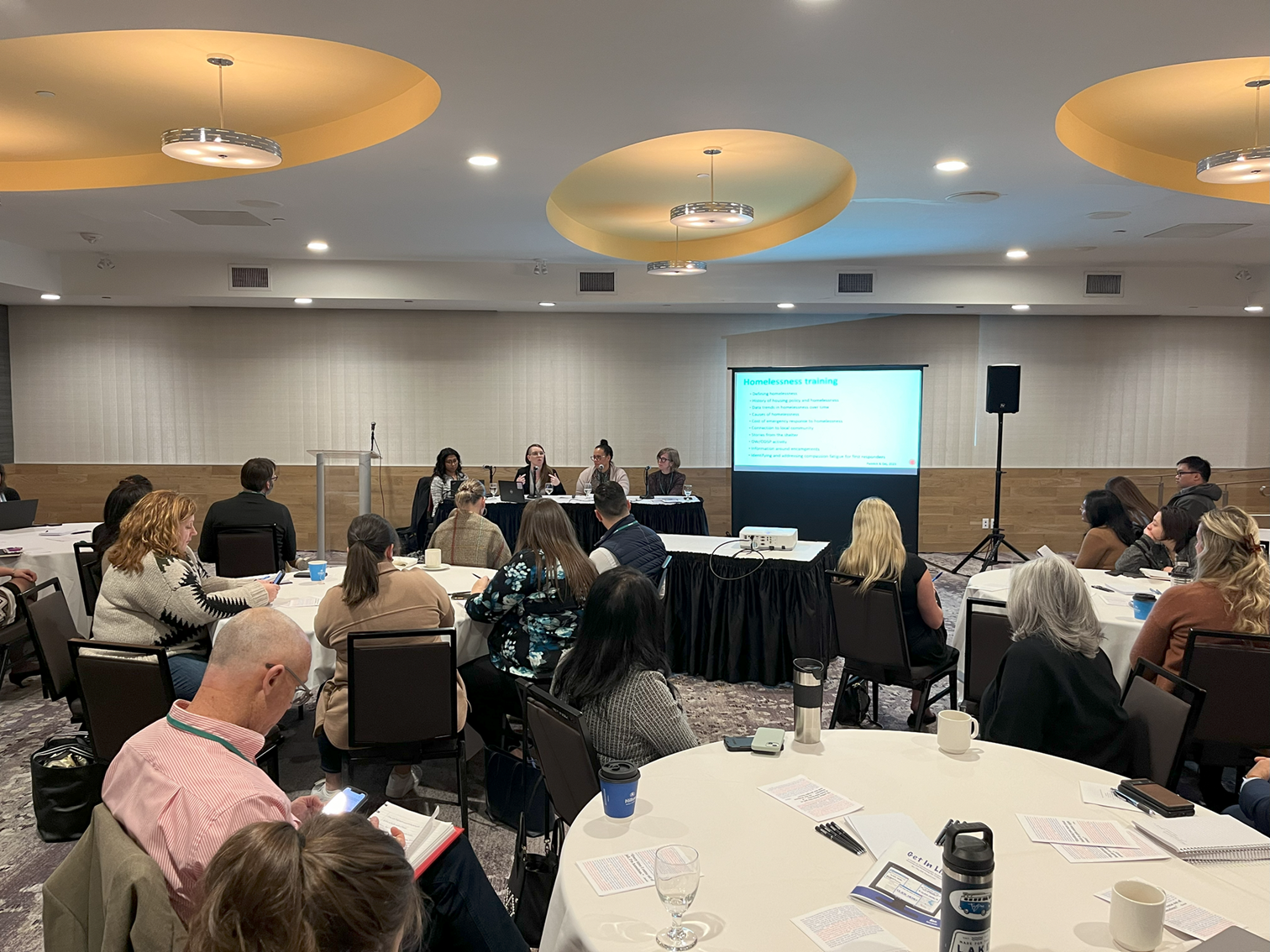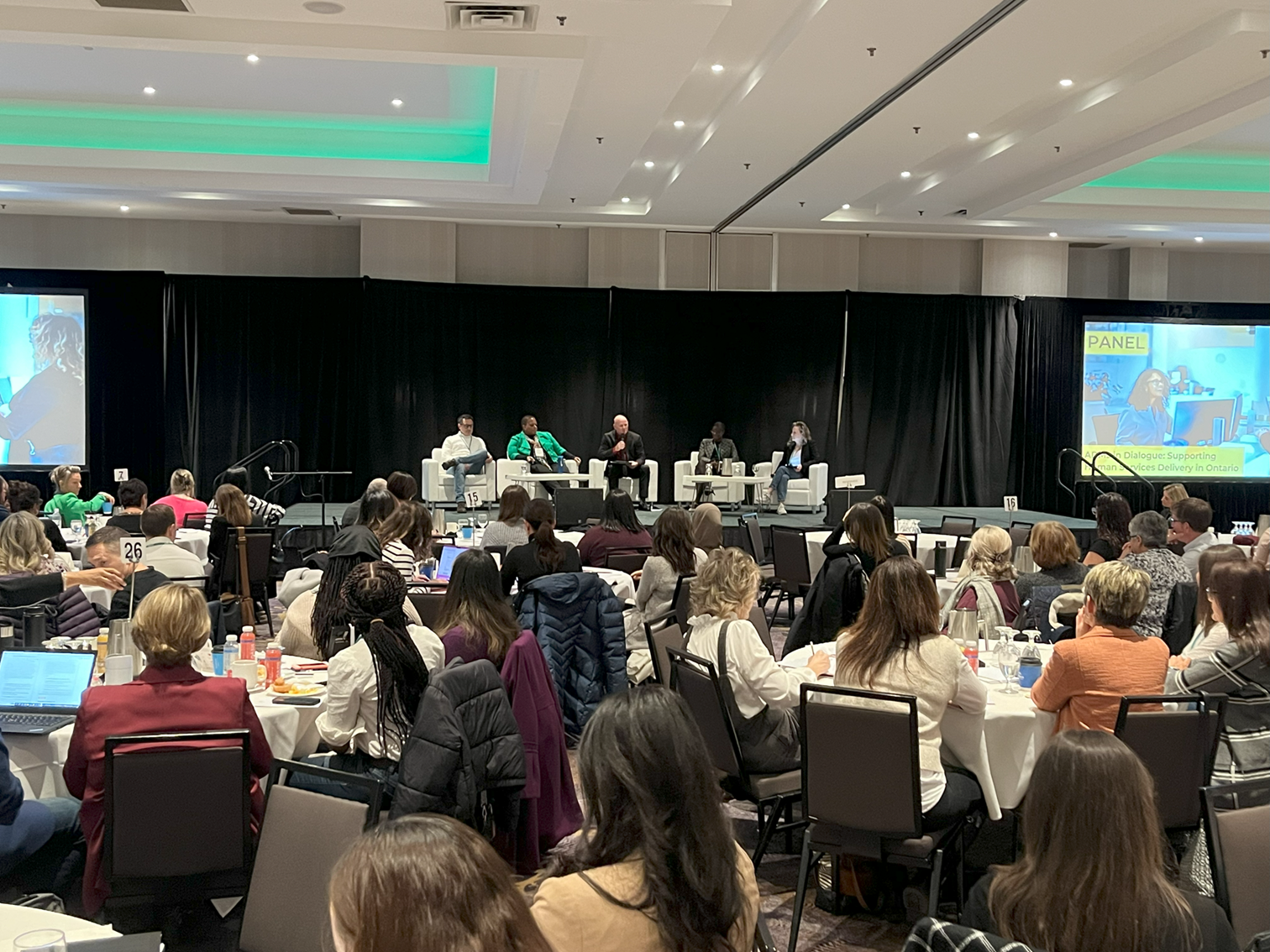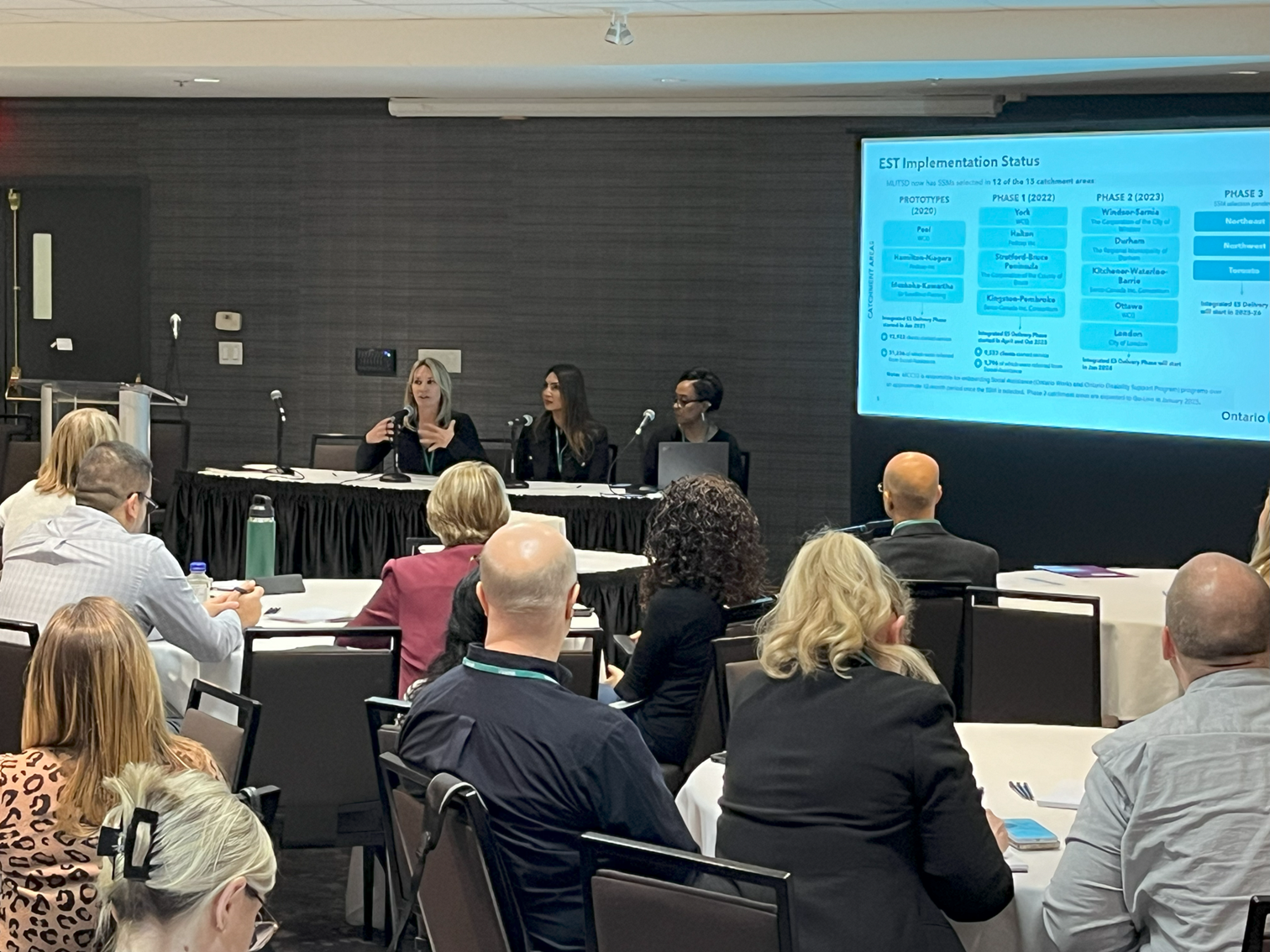Highlights from OMSSA's 2023 Policy Conference
Highlights from OMSSA's 2023 Policy Conference
By: Tod Duncan & Nalisha Sankreacha
February 2024

Day 1 – November 30
The Annual Economic and Policy Update
The opening plenary of the OMSSA Policy Conference is an opportunity to hear from economists and policy experts about the year ahead. This year’s panel expanded on last year's format by both lengthening the session and bringing in new perspectives. The three economists on the panel provided insights into Ontario’s economic health, the province’s capacity to expand the Canada-wide Early Learning and Child Care system, and the challenges being faced by people navigating the current labour market. Of course, the key topic of this year’s session was affordability, and in particular housing affordability. Panelists provided a reminder of how this housing crisis has particularly affected both Indigenous and recent immigrant communities. In the case of asylum seekers, the situation has become so tragic that finding housing respite in the prison system has become a stark reality for many.
Housing Solutions from your OMSSA Peers
In a housing ecosystem with many gaps, both bridge and supportive housing are of particular need since they often help to mitigate a person’s return to homelessness. Where they exist, these forms of housing provide a platform for stability for those fortunate enough to have access. In a session focusing on looking at housing successes in the District of Sault Ste Marie and the Regional Municipality of Niagara, participants learned of the steps the latter have taken to develop these additional housing options to take pressure off their temporary shelter systems. Working with OrgCode Consulting, these OMSSA Members provided insights into the solutions that they developed. The lessons that emerged from the session were that not only is there a need to be innovative in your approach to solving these problems, but perhaps more importantly, there is a need to be persistent and not give up.
Harm Reduction in the Social Services
In this session, we heard from several experts, including people who use drugs (PWUD), who spoke about harm reduction and treatment. There was a specific focus on how to best support people who use drugs and how to respect and empower people to reach their own goals. This lively conversation offered three main takeaways:
1. Harm reduction exists on a spectrum. Harm reduction can be as basic as offering someone use of a bathroom when they appear to be in distress.
2. Treatment programs have a long way to go and are not a one-size-fits-all. Many 12-step treatment programs that exist today are still quite limited, racist, and oppressive. Treatment programs often also have long waitlists and associated costs, and are not as accessible as we might think.
3. Harm reduction policies need to be adaptable and can start small. Something as simple as having a naloxone kit on the premises of your office is a form of harm reduction.
From NIMBYism to YIMBYism 
There are few more challenging issues faced by OMSSA Members than the issue of NIMBYism as it relates to finding sustainable supports for people with vulnerabilities. The packed attendance for this breakout session speaks to how NIMBYism has impacted social services responses. The panelists for this session brought insights based on their work doing community-based research on homelessness. While they provided several important takeaways, there were a few that stood out:
- Service providers should focus their outreach on undecided community members
- Economic benefit arguments are far less persuasive than narratives that focus on people’s humanity
- Engage those with lived expertise as their stories should inform policy approaches
- Build systems that support community resilience, rather than ones that respond to crises
- Apply a human rights-based approach in your work
Ultimately, success will come down to how effectively Members can engage stakeholders and how much trust can be built with them. By no means an easy task, but the end result is often worth it.
Strengthening EarlyON
EarlyON is a vital tool for building resilient communities in Ontario. But, with the focus on the roll-out of Canada-Wide Early Learning & Child Care (CWELCC), it has often had to take a backseat when it comes to children’s services policy considerations. As a discussion-based session, this breakout invited OMSSA Members to focus on the issues affecting EarlyON, both locally and province-wide. This session helped to connect OMSSA’s EarlyON managers, while also repositioning this provincial program as a policy focus for the upcoming year.
Day 2 – December 1
Updates from the ADMs 
On Day 2 of the conference, the opening plenary allowed attendees to hear from the ADMs of Ministry of Children, Community and Social Services (MCCSS), Ministry of Education (EDU), Health, and Ministry of Municipal Affairs and Housing (MMAH). Each ADM provided an update on their portfolios and then were asked questions that were submitted by OMSSA Members in advance of the conference. Based on the questions submitted, integration between the Ministries continues to be a hot-button issue for many. While the level of integration may not be apparent on the surface, a key theme of each ADMs comment was that they each work very closely together and that integration is taking place on many levels within the Province in ways that are not often seen. This has been particularly true of recent urgent issues related to seeking support for newcomers. Indeed, the ADMs have been in regular contact with each other and with their Federal counterparts on this issue.
The OMSSA Policy Conference was pleased to have ADMs appear on the main stage this year and is hopeful that this session will be a fixture of future events.
Using a Human Rights-Based Approach
Speakers in a number of the sessions at this year’s conference referred to the need for OMSSA Members to begin using a human rights-based approach in their work. Fortunately, the conference also offered a robust introduction to this topic led by the Ontario Human Rights Commission. In this popular session, attendees heard how a human rights-based approach can help inform and guide municipal policy, programs, and services. Because of the obvious benefits of enlisting this approach — not the least of which is to mitigate discrimination — OMSSA Staff plan to bring this session back to the Exchange Conference in the Spring of 2024.
Responding to Human Trafficking
This breakout brought together several vital perspectives to explore the topic of human trafficking and the role of human services staff. In this interactive session, speakers learned that the audience was somewhat familiar with this topic and was looking to learn how to adapt current services and support for victims/survivors of human trafficking. The panel began by defining human trafficking, which was followed up by a conversation about the unique needs of those who have been trafficked and how this relates to access to housing, income support and child care. Panelists emphasized the importance of safety and privacy, including personal housing space, and how this specifically contributes to a victim’s/survivor’s life stabilization journey.
Local Solutions in the Employment Services Transformation (EST) 
This robust breakout session had a full contingent of presenters representing the Ministry of Labour, Immigration, Training and Skills Development (MLITSD), MCCSS, OMSSA Members, and Service System Managers. With so many speakers involved, there was plenty of information to be digested.
This session heard a joint EST update from MLITSD and MCCSS, followed by presentations based on a local solutioning initiative that has emerged via the transformation process. SSMs Fedcap and WCG Services provided insights into the solutions-focused work that they have engaged in with Hamilton, Halton, and Peel, respectively. Their stories suggest that while there were challenges early on, there have been many more opportunities moving forward.
Moving Forward on Special Needs Resourcing
The impetus for this session emerged directly from the Children’s Services Leads discussion on this very issue. It was clear that given the work that will be carried out shortly to update OMSSA’s Children’s Services policy paper, a thorough-going discussion of special needs resourcing (SNR) needed to take place among the Members. This session was about bringing members together to get a snapshot of what is happening around the province. Moving forward, this session has also set the foundation for OMSSA to provide feedback on this topic given that it was announced in the ADM session that the province would be undertaking an SNR review.
Mental Health and Equity
Following the ceremonial signing of a memorandum of understanding between the Canadian Mental Health Association – Ontario and OMSSA, the 2023 Policy Conference concluded with a panel discussion revolving around equity and access to mental health resources both in the social services workforce and for people using social services. Recent figures related to one Canadian benefits provider have shown an unprecedented increase in mental health therapy and drug claims. Statistics related to this benefits provider’s municipal, hospitals, schools, and university sectors show a 37% increase in mental health-related claims comparing January through October in 2022 and 2023. This translates to a total payment of $297,698,884 and a 59% cost increase from the comparator period.
A key point raised was that often due to structural inequalities equity-deserving groups experience more mental health-related issues, but generally don’t seek support. At the same time, while more women from diverse backgrounds are seeking help, 66% of them are not satisfied with the service they are receiving. This points to the fact that the therapeutic relationship is key to a person’s success and should translate to a need for greater diversity within mental health professions. Ultimately, there is a need to right-size where people seek support. Do they need a psychiatrist, psychologist or psychotherapist? The health system can save a lot of money if people can go to where they can find the right support. For employers, for instance, this means adapting benefits plans to the demographics of their employees where trends indicate younger employees tend to seek therapy, while older employees tend to use pharmaceuticals to support their mental health needs.
What's In Store for 2024?
With another OMSSA Policy Conference concluded, we’ve learned that there continue to be profound challenges to the social services sector. But knowing the energy and enthusiasm through which OMSSA Members approach their work, it’s assured that throughout 2024 we will hear stories of amazing successes that have been achieved. We hope that the next Policy Conference will be another opportunity to interrogate the challenging issues faced by members, as well as to celebrate the solutions that they have found. We look forward to seeing you at our 2024 event!
About the Authors


Blog categories: OMSSA Policy Conference, Economic Policy Update, Child Care, EarlyON, Housing, Employment Services Transformation, Human Services, Mental Health, Special Needs Resourcing, Human Trafficking